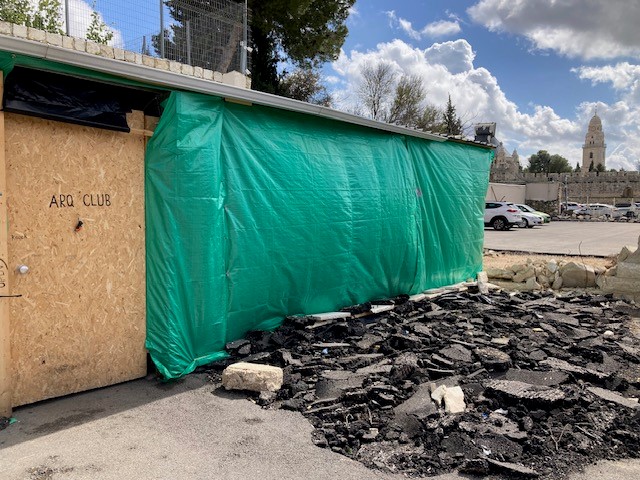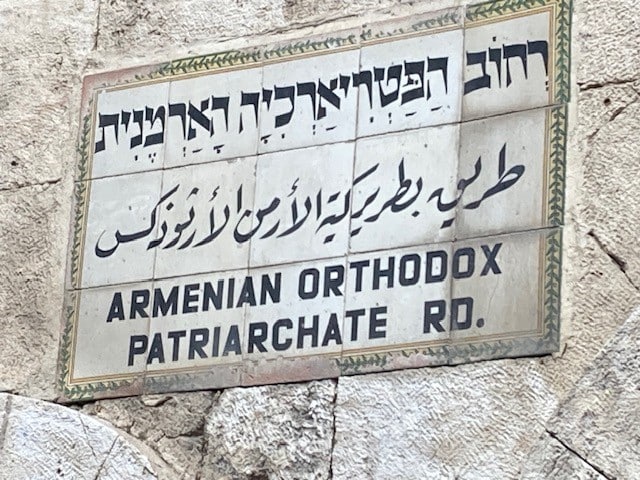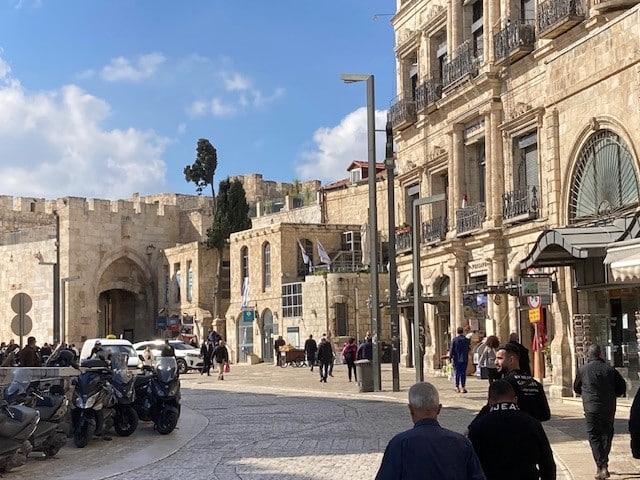‘The Armenian and Christian Quarters face great threats… We are fighting for our brothers and sisters in this city.’
Hagop Djernazian, local activist for the SaveTheArQ movement
‘It’s an existential crisis,’ says 23-year-old student and community activist Hagop Djernazian, as we sit in the makeshift tent that he and others have erected as a base for their resistance to the threat against them. In the last 12-months the Armenian community of Jerusalem, which numbers 2,000, has been galvanised as never before to protect the historic Armenian Quarter of the Old City.

Resistance tent in the Armenian Quarter
The Armenian Apostolic Orthodox Church is ancient. In the fourth century Armenia adopted Christianity as a state religion – it was the first state to do so – and Armenian monks arrived in Jerusalem. An Armenian bishop of Jerusalem (later designated the Patriarch or senior church leader) was appointed in the seventh century, and an Armenian Quarter grew up around the Armenian Cathedral of St James. Worship continues in the Cathedral to this day, and the Quarter is also home to Armenian residents, restaurants, and workshops creating and selling the delicate hand-painted pottery for which Armenia is famous.

Armenian pottery in the Jerusalem Old City market
In 2021 the Armenian Patriarch concluded an agreement with an Israeli Australian developer, Danny Rubinstein. The agreement leased almost three acres of land within the Quarter to Rubinstein’s company for the building of a luxury hotel. The land is currently used for five housing units, a community hall, and a large car park for the local Armenian population.
Serious questions are being asked about the process leading to the land’s alienation. The proposal was not approved by the relevant church governance. The Patriarch maintains that he was unaware of the full extent of the agreement – and has disciplined the priest who led the negotiations before subsequently moving abroad.

Armenian Quarter street sign
But the community’s sense of outrage is less to do with the disadvantageous terms of the agreement (albeit that it disposes of a huge tract of highly desirable real estate on terms extremely favourable to the developer) than it is to do with the loss of what which they regard as a crucial part of their national heritage. Hagop Djernazian, whose family have lived in the city since they fled the Armenian genocide of 1915-1923, says;
‘Our struggle is for our existence in Jerusalem…to preserve our heritage and identity, and to make sure future generations will be able to live in Jerusalem and enjoy the rights we have as Armenians and as Christians.’
Hagop is a co-founder of the SaveTheArQ movement; we were joined on the site by his colleague Setrag. Together they emphasize that the Patriarch is ‘Custodian of National Properties’: properties given to the Armenian Church in Jerusalem by generations of Armenian Christians and pilgrims to the Holy Land over hundreds of years.
Moreover, they fear that if the agreement is implemented and the hotel built, their historic quarter will be decimated. There will be no houses for local Armenians; no community hall for them to gather; and no place to park for their dispersed community (or for the Muslims and Jews who also make use of the facility). The entrance to the Armenian theological seminary will be compromised, and the Armenian Quarter will be cut off from the Christian Quarter of Jerusalem’s Old City. The Armenians insist that the religious and ethnic diversity of Jerusalem will be dealt a severe blow.
‘promulgating the idea of the entire area as an Israeli environment, and imposing a nationalistic Israeli character that blurs the multi-religious and multi-cultural nature of the space.’
The Armenians are keenly aware that their situation has echoes of that which has developed in nearby Jaffa Gate, where two Christian Quarter hotels have been sold by the Greek Orthodox Church in Jerusalem to an Israeli settler organization in circumstances that have been hotly disputed and have been the subject of legal proceedings. Armed settlers entered one of the hotels in March 2022 and took up residence there. ‘The Armenian and Christian Quarters face great threats,’ says Hagop. ‘We are fighting for our brothers and sisters in this city’.

Jaffa Gate: Main entrance to Christian Quarter in Jerusalem
The community began to demonstrate against the land deal weekly, from May to September 2023. The Armenian Church has launched a legal action intended to cancel the agreement; when we visited the campaigners’ tent they were about to launch their own, in the name of three hundred of their supporters.
Supporters of the development have met such resistance with violent aggression. In October 2023, with global attention focused on the war in Gaza, bulldozers began to break up the asphalt of the land. The community responded by sitting down in front of the machines. Israeli settlers and others have attacked them with sticks, stones, and dogs – notably during the Christmas season, on 28 December 2023. ‘They want to take everything,’ said another campaigner, a manager of a Jerusalem hotel.
In the face of these assaults the Armenians have erected a tent in one corner of their land, in which they are present at all hours of the day and the night. Five or six sleep there nightly, and every day fifty to one hundred call by to sit, bring food, and offer solidarity. When we visited, Setrag had spent the night in the tent, and was heading off to work in his family’s ceramics business. They have built a barricade across the car park to prevent further incursions and have taken control of the property’s road entrance by installing a security guard (in defiance of the development company, which has installed a rival guard).
The Heads of Churches in Jerusalem have issued a joint statement in support of the Armenians’ cause:
‘The provocations that are being used by the alleged developers to deploy incendiary tactics threaten to erase the Armenian presence in the area… weakening and endangering the Christian presence in the Holy Land’.
The community are anxious for Christians worldwide to understand that their ancient community is under threat and that the Christian presence in Jerusalem is at risk. Hagop reiterates;
‘We are very determined. We will go to the end.’
Take action!
-
Follow, support and share the #SavetheArQ campaign on Twitter, Facebook and Instagram.
-
Use our quick template letter to send this eyewitness story to your elected representatives and faith leaders and ask them to call for justice.
-
Part of a church or other faith community? Join the campaign to ensure they are not investing funds in companies that profit from the occupation.


